Featured
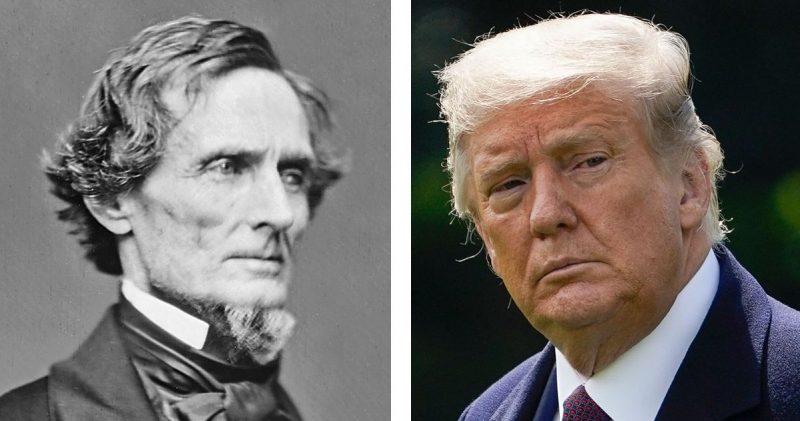 The Party of White Grievance Has Never Cared About Democracy. By Steve Phillips / The Nation
The Party of White Grievance Has Never Cared About Democracy. By Steve Phillips / The Nation
From the Democrats of the Civil War era to the Republicans of the Trump years, the white party has always posed the greatest threat to our political system. The hard truth is that whichever United States political party has been most rooted in the fears, anxieties, and resentments of white people has never cared much about democracy or the Constitution designed to preserve it. Those who do want to make America a multi-racial democracy must face this fact with clear eyes and stiff spines to repel the ever-escalating threats to the nation’s most cherished institutions and values. Shown is Jefferson Davis, President of the Confederacy, and his modern Republican counterpart. Read more
Political / Social
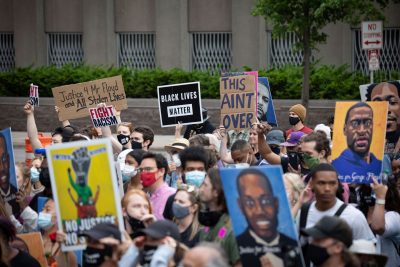 George Floyd, the Tulsa Massacre, and Memorial Days. By Jelani Cobb / The New Yorker
George Floyd, the Tulsa Massacre, and Memorial Days. By Jelani Cobb / The New Yorker
This year, Memorial Day, the national holiday on which we commemorate the men and women of the American military who died in the course of war, falls on May 31st, a date that marks the centennial anniversary of the Tulsa massacre, a racial pogrom in which the Black population of the prosperous Greenwood District of that city was attacked, murdered, and terrorized, leaving as many as three hundred dead. Last year, Memorial Day fell on May 25th, the day that George Floyd died, in the custody of a white Minneapolis police officer; the ineffable terribleness of the video depicting his death soon launched a wave of chaos and fury that swept across the nation. Read more
 100 Years After the Tulsa Massacre, What Does Justice Look Like? By Caleb Gayle / NYT
100 Years After the Tulsa Massacre, What Does Justice Look Like? By Caleb Gayle / NYT
When it was her turn to testify, Crutcher told the subcommittee: “The nation’s government cannot sit on the sidelines as Mother Randle, Mother Fletcher, Uncle Redd” — Van Ellis — “spend their twilight years fighting for justice 100 years after the massacre.” With fervor but steely focus, she said, “All we’re asking for in Tulsa and Black communities across the U.S. is repair, respect and restitution.” Read more
Related: How Tulsa’s Greenwood massacre echoes today. By Brit McCandless Farmer / CBS News
Related: A Century After The Race Massacre, Tulsa Confronts Its Bloody Past. By Debbie Elliott / NPR
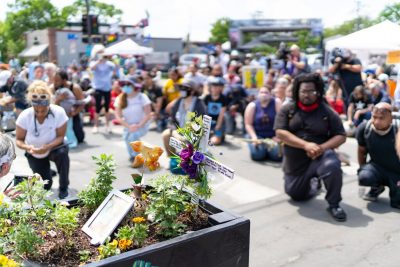 ‘On the Ashes of Tragedy’: Mixed Emotions on Anniversary of George Floyd’s Death. Tim Arango and
‘On the Ashes of Tragedy’: Mixed Emotions on Anniversary of George Floyd’s Death. Tim Arango and
It was a day of reflection, of remembrance, a time to lay flowers and say prayers, to celebrate Black culture with art and music and food, and to recall the life of a man whose death, one year ago, shook the country and forced it to confront its painful legacy of racism and police brutality. In Minneapolis on Tuesday, as people gathered to mark the anniversary of the police killing of George Floyd, there was space for it all: the trauma and the grief; some celebration, over a murder conviction of a police officer; and a measure of hope, too, that in death Mr. Floyd, a Black man, had nudged America toward more racial equality. Read more
Related: A year after George Floyd’s death, America is still grappling with police violence and reform.
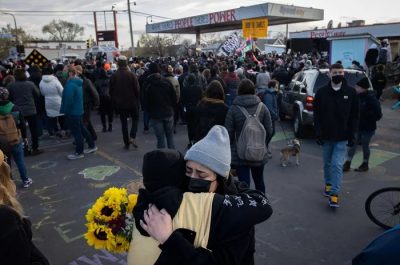 What George Floyd’s Death Has Done For Americans’ Ability To Feel Empathy. By Bill Chappell / NPR
What George Floyd’s Death Has Done For Americans’ Ability To Feel Empathy. By Bill Chappell / NPR
“I can’t breathe.” “I’m scared.” For many people, hearing someone say those words would prompt a scramble to help. But not all. It depends on who’s listening. A year ago Tuesday, the world watched as George Floyd’s life was taken from him in an agonizing 9 1/2-minute video — a murder a police officer was convicted of committing. This month, we saw long-suppressed footage of troopers stunning and punching Ronald Greene as he apologized for leading them on a high-speed chase. He too died. Millions of us watched those videos. But we didn’t all see the same things, and part of the reason is empathy. On a basic level, how we hear the words of Floyd — and more recently, the words of Greene — depends on our level of empathy. Read more
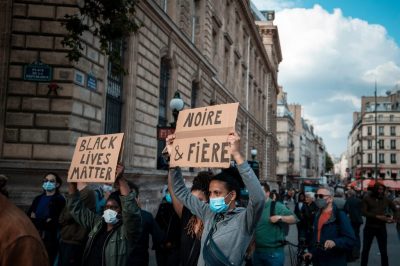 George Floyd and the Global Fight for Black Lives. By Mickell Carter / AAIHS
George Floyd and the Global Fight for Black Lives. By Mickell Carter / AAIHS
In the past year, several countries have condemned the U.S. for its mistreatment of Black people, poor race relations, police violence, and expressed solidarity with the Black Lives Matter movement. Yet, the deaths of George Floyd and Breonna Taylor resonated not only with Black Americans, but also with Black citizens of France, the U.K., and other nations guilty of similar abhorrent acts. Read more
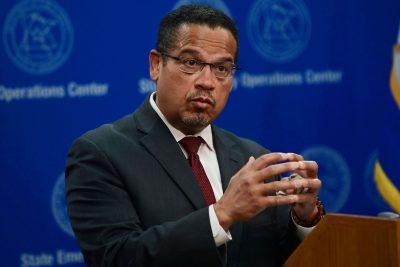 Keith Ellison reflects on the year since the murder of George Floyd. By Jonathan Capehart / Wash Post Podcast
Keith Ellison reflects on the year since the murder of George Floyd. By Jonathan Capehart / Wash Post Podcast
The Minnesota attorney general discusses the Floyd case and the need for Congress to take immediate action on police reform. Listen here
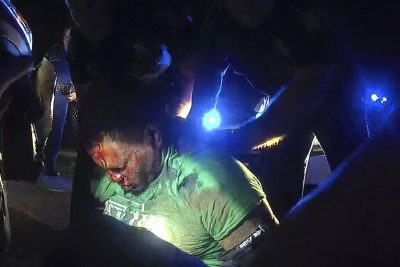 Officer Withheld Video Of Ronald Greene’s Deadly Arrest For Nearly 2 Years. By Jim Mustian / HuffPost
Officer Withheld Video Of Ronald Greene’s Deadly Arrest For Nearly 2 Years. By Jim Mustian / HuffPost
In perhaps the strongest evidence yet of an attempted cover-up in the deadly 2019 arrest of Ronald Greene, the ranking Louisiana State Police officer at the scene falsely told internal investigators that the Black man was still a threat to flee after he was shackled, and he denied the existence of his own body camera video for nearly two years until it emerged just last month. Read more
Related: Cop in Ronald Greene’s deadly arrest made false claims: Documents. CBS News
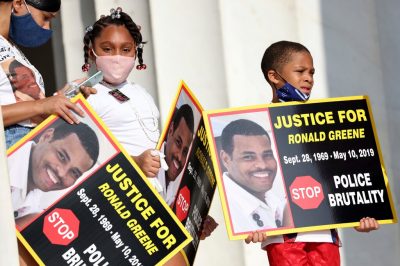 White Troopers Policing Black Bodies. By Charles M. Blow / NYT
White Troopers Policing Black Bodies. By Charles M. Blow / NYT
All these cities and towns are majority Black and their administration, including policing, reflect that to some degree. These spaces always felt special to me, at least in the relationship between municipal power and the people. But between those safe spaces, along Interstate-20, the Louisiana State Police reigned. We called the officers state troopers. The feeling they gave, at least to me, was not one of safety. All of this is why the killing of Ronald Greene in 2019, and the recently released video from one trooper’s body camera footage of the arrest, obtained by The Associated Press, that is discordant with the official police report of the incident, has been so resonant for me. Read more
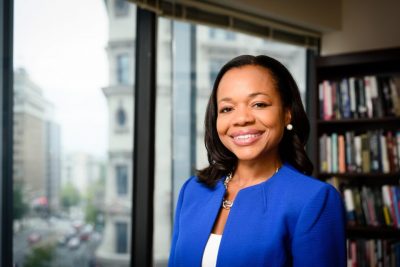 Senate Confirms Kristen Clarke To Lead DOJ’s Civil Rights Division. /HuffPost
Senate Confirms Kristen Clarke To Lead DOJ’s Civil Rights Division. /HuffPost
The Senate voted Tuesday to confirm Kristen Clarke to lead the Justice Department’s civil rights division, making her the first woman ― and first Black woman ― to oversee the powerful division created in 1957 as the civil rights movement took hold. Every Democrat voted to confirm Clarke as assistant U.S. attorney general. Every Republican but one, Sen. Susan Collins of Maine, opposed her. The final tally was 51-48. Sen. John Kennedy (R-La.) did not vote. Read more
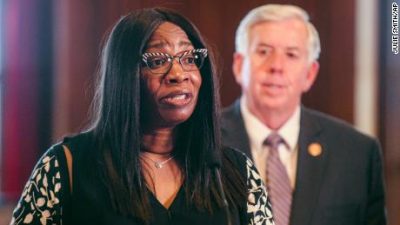 First Black Woman Judge Appointed To Missouri Supreme Court.
First Black Woman Judge Appointed To Missouri Supreme Court.
Missouri Gov. Mike Parson appointed Judge Robin Ransom to serve on the state’s Supreme Court, where she’ll make history as the first Black woman in the position. The Republican governor said he was “proud and honored” to announce this appointment on Monday. Ransom is filling a vacancy from another judge who retired earlier this year. In a press conference, Ransom said she was “humbled” by the appointment and that it was “not lost on me the historic nature … to be the first African American woman appointed to the Missouri Supreme Court.” Read more
 The harsh spotlight on Black women leading big cities. By Maya King / Politico
The harsh spotlight on Black women leading big cities. By Maya King / Politico
The summer of 2020 thrust Black women center stage as mainstays of the Democratic Party with the power to help swing a presidential election. But for Black women leading the nation’s biggest cities, 2020 was an often rude introduction to the limitations of that power. Nine Black women mayors now lead big cities, a historic high. All hold office in the midst of a deadly pandemic that has laid bare systemic inequities — and only heightened demands for police reform. Read more
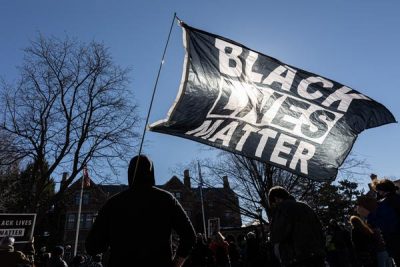 Black Lives Matter Fights Disinformation To Keep The Movement Strong. By Cheryl Corley / NPR
Black Lives Matter Fights Disinformation To Keep The Movement Strong. By Cheryl Corley / NPR
On May 25, 2020, George Floyd died under the knee of Minneapolis police officer Derek Chauvin and protests erupted worldwide. Support for Black Lives Matter — the movement that actually began as a hashtag in 2013 — surged. To this day, posts on social media continue to call for racial justice and an end to police brutality. But also online are posts riddled with disinformation, including those specifically targeting BLM. Activists charge that those disparaging posts are part of an overall effort to undermine the movement and its message. Read more
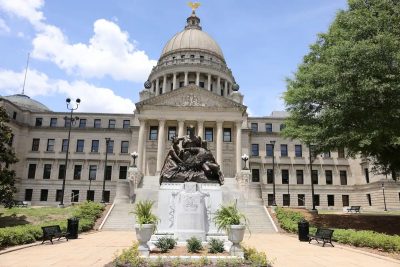 No need for new GOP voter suppression in Mississippi. We’re already there. By Michael Foley / Wash Post
No need for new GOP voter suppression in Mississippi. We’re already there. By Michael Foley / Wash Post
Since Joe Biden earned a record number of votes in November’s presidential election, many Republican-led states — Florida, Georgia and Texas prominently among them — have scrambled to roll out legislation that seems intended to suppress voting. Notably absent from this phenomenon has been Mississippi, the state with the highest proportion of Black people (38 percent) in the nation. There was no need for the Republican-dominated state legislature to jump on the voter-suppression bandwagon: We already have some of the most restrictive laws in the nation. And recent developments show that changes to give greater voice to Mississippi voters won’t be coming anytime soon. Read more
 Dylann Roof appeals death sentence in Charleston church slayings. By Ann E. Marimow / Wash Post
Dylann Roof appeals death sentence in Charleston church slayings. By Ann E. Marimow / Wash Post
Dylann Roof asked an appeals court Tuesday to overturn his conviction and death sentence for the massacre he carried out at a historic African American church in Charleston, S.C., in 2015. Roof was the first person sentenced to death for a federal hate crime for killing nine Black parishioners as they prayed during Bible study at Emanuel African Methodist Episcopal Church. Read more
 ‘Permanent damage’: can minority-owned businesses recover from pandemic’s toll? By Alexandra Villarreal / The Guardian
‘Permanent damage’: can minority-owned businesses recover from pandemic’s toll? By Alexandra Villarreal / The Guardian
Minority-owned firms have suffered temporary or permanent closures at disproportionately high rates during the pandemic, the Federal Reserve Bank of Cleveland reported. Over the first two months of the health crisis, the number of active Black, Latino and Asian business owners plummeted by 41%, 32% and 26% respectively, versus just 17% for white entrepreneurs. That outsized toll has lasted well into 2021, when half of small and mid-sized minority-owned businesses couldn’t pay all of their April rent on time, according to a recent poll. Read more
Related: Small Businesses Have Surged in Black Communities. Was It the Stimulus? / NYT
Historical / Cultural
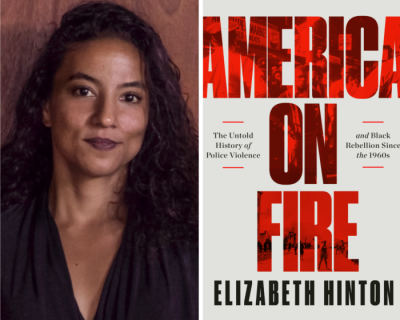 Understanding the History of Black Rebellion. By Jeremy Scahill / Intercepted Podcast
Understanding the History of Black Rebellion. By Jeremy Scahill / Intercepted Podcast
IN THE YEAR since the murder of George Floyd in Minneapolis and the mass mobilization of protest that followed — the largest collective gesture against police violence in this country’s history — there’s been a constant and energized call to defund or outright abolish policing as we know it in the U.S. Historian Elizabeth Hinton, author of “America on Fire: The Untold History of Police Violence and Black Rebellion since the 1960s,” argues that protestors were not rioters but rather political participants in rebellion against their own poverty, inequality, and constant surveillance and brutality by the police. Listen here
 How purity culture and anti-Asian racism intersect in some white evangelical circles. By Sarah Ngu / NBC News
How purity culture and anti-Asian racism intersect in some white evangelical circles. By Sarah Ngu / NBC News
“Purity culture,” a subculture of evangelical Christianity that peaked in the 1990s — with young girls pledging to their fathers to abstain from sex until marriage by wearing “purity rings” — is still present today. It forbids sexual activity outside of heterosexual marriage and places the responsibility on women to manage men’s sexual desires by dressing modestly and not tempting them. The intersection of purity culture and anti-Asian racism is familiar to many Asian American Christian women, who say there’s long been a connection between the two among white, conservative Christians. Robert Aaron Long, the man who has been charged with killing eight people, six of them Asian women, at three Atlanta-area spas in March, had a “sex addiction” and a “temptation for him that he wanted to eliminate.” Read more
Sports
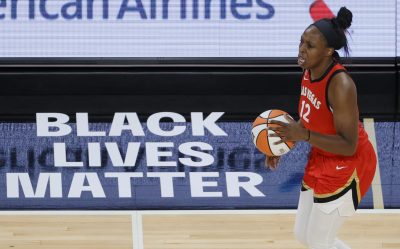 A year after George Floyd’s murder, NBA, WNBA players push to pass police reform. By Candace Buckner / Wash Post
A year after George Floyd’s murder, NBA, WNBA players push to pass police reform. By Candace Buckner / Wash Post
On the anniversary of George Floyd’s murder by a Minneapolis police officer, the NBA, the NBA and WNBA players’ unions and a player-backed voter rights group have escalated their calls for the passage of the law enforcement bill that bears Floyd’s name. Behind its newly formed Social Justice Coalition, the NBA has become the first major American professional sports league to publicly advocate for the George Floyd Justice in Policing Act. In a statement released ahead of the first anniversary of Floyd’s death Tuesday, the NBA vowed to use its platform to support the bill and other “common-sense policy” reforms that ensure equality. Read more
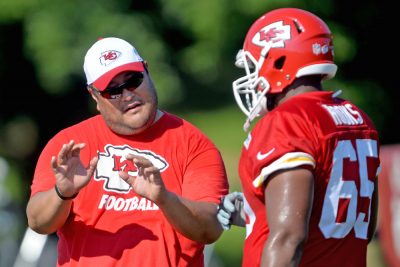 NFL investigating after ex-coach said he was told he was ‘not the right minority’ during interview. By Minyvonne Burke / NBC News
NFL investigating after ex-coach said he was told he was ‘not the right minority’ during interview. By Minyvonne Burke / NBC News
Eugene Chung said an interviewer told him recently that he was “not the right minority” they were looking for, according to the Boston Globe. He didn’t name the official or the team. “I was blown away, emotionally paralyzed for a split second,” he said. “I asked myself, ‘Did I hear that correctly?’ ” NFL spokesman Brian McCarthy said the league will review the matter, calling the comment “completely inappropriate.” Shown is Kansas City Chiefs assistant offensive line coach Eugene Chung who talks with lineman Tavon Rooks during NFL football training camp practice. Read more
 Hayden Swank, called a race car driving wunderkind, navigates college and racism. By Curtis Bunn / NBC News
Hayden Swank, called a race car driving wunderkind, navigates college and racism. By Curtis Bunn / NBC News
From the Atlanta-area town of Woodstock, Swank has been considered by many a wunderkind of race car driving. So far, he has racked up more than 20 wins since he first eased behind a steering wheel of a quarter midget car when he was 7 years old. Fulfilling his promise, though, was precarious until he and his team gained sponsorships from Overtime, the sports brand and basketball league, and the men’s grooming brand Old Spice. Read more
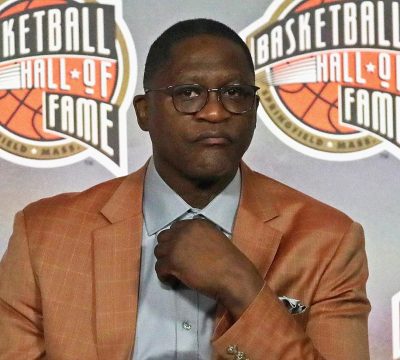 Atlanta restaurant apologizes to Dominique Wilkins after he accuses it of racist treatment. By Des Bieler / Wash Post
Atlanta restaurant apologizes to Dominique Wilkins after he accuses it of racist treatment. By Des Bieler / Wash Post
Visit our home page for more articles, book/podcast and video favorites. And at the top of this page register your email to receive notification of new editions of Race Inquiry Digest. Click here for earlier Digests.
About Race Inquiry and Race Inquiry Digest. The Digest is published on Mondays and Thursdays.
Use the buttons below to share the Digest in an email, or post to your Facebook, Linkedin or Twitter accounts.